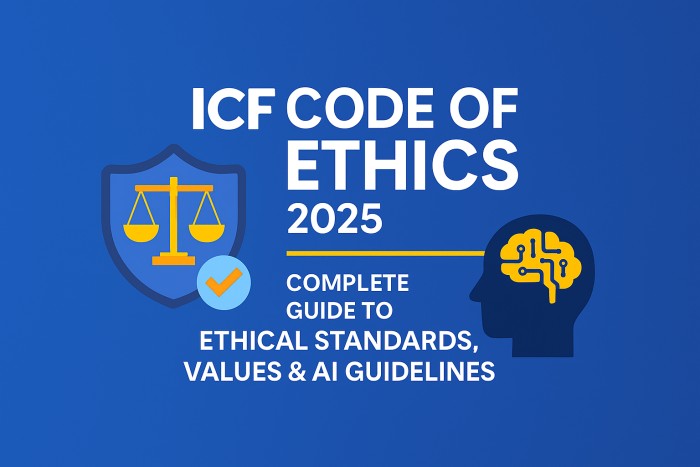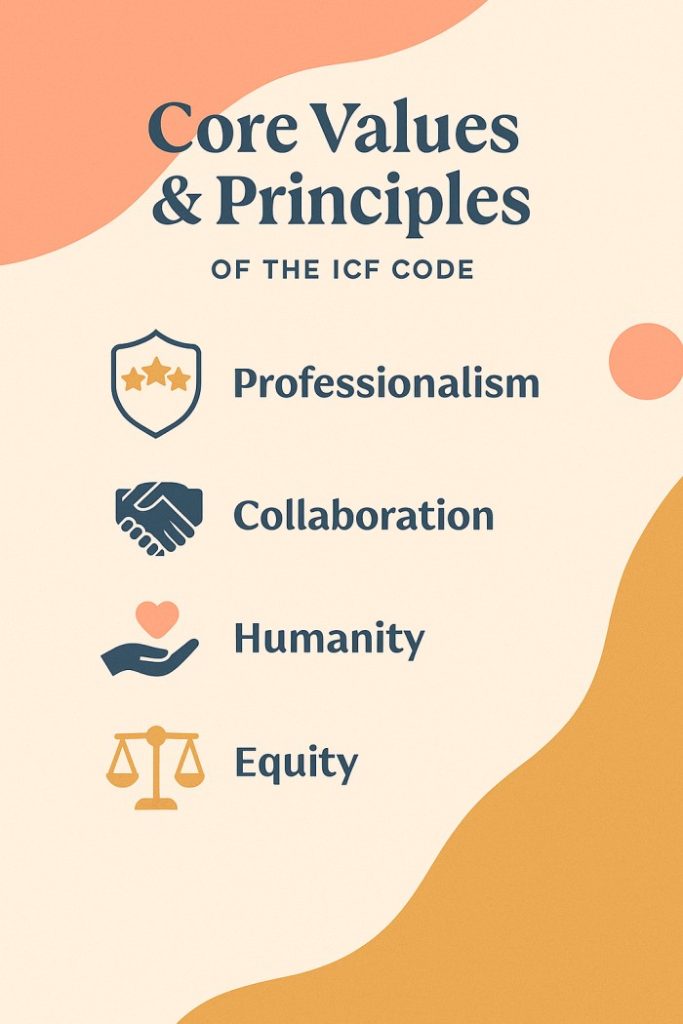
Effective strategic planning and stakeholder management are essential skills for leaders in a rapidly changing business environment. Strategic planning provides...
The coaching profession is built on trust. Clients come to coaches with their goals, fears and vulnerabilities, expecting confidentiality, professionalism and clear boundaries. The International Coaching Federation (ICF) establishes the standards that guide coaches worldwide, ensuring our practices are ethical, fair and consistent. The ICF Code of Ethics — a living document outlining the principles and behavioural expectations for all coaches — was updated in 2025 to reflect rapid changes in society, technology and our understanding of professional responsibilities.
In this article you will find a comprehensive analysis of the 2025 Code, its ethical standards and how to apply them. We examine updates that broaden the Code’s scope to include volunteers and staff within the ICF ecosystem, introduce stricter confidentiality standards and address the use of AI and technology. You will also discover the expanded list of core values and practical guidance on navigating conflicts of interest and other ethical dilemmas.
Whether you are an experienced coach, a student preparing for certification or an organisational leader, understanding the ICF Code of Ethics is essential for maintaining the integrity of coaching. Following the template above, this guide utilises headings, tables and examples to maximise readability and SEO performance. Sections also include strategic internal and external links, visuals and calls to action.
The ICF Code of Ethics is a formal document detailing the values, principles and ethical standards that guide coaches, mentors, trainers, supervisors, students and others associated with the International Coaching Federation. It is designed to protect clients, ensure fairness and uphold the credibility of coaching as a profession.
According to the ICF, the Code summarises why ethical standards matter and the obligations coaches have toward clients, colleagues and society. It serves as a legal and professional contract: coaches commit to confidentiality, transparency and ongoing competence. The Code is updated periodically to keep pace with changes in coaching practice, legal requirements and societal expectations.

Prior to the 2025 update, the most recent major revision to the Code occurred in 2021. The 2021 Code consisted of four sections: Responsibility to Clients, Responsibility to Practice, Professionalism, and Responsibility to Society. It emphasised a “do no harm” philosophy, focusing largely on avoiding unethical behaviour — akin to a medical Hippocratic Oath.
However, new ethical challenges emerged rapidly: digital coaching platforms, artificial intelligence tools, remote sessions and complex confidentiality issues. Additionally, the ICF community recognised the need for more inclusive, proactive language and specific guidance around conflicts of interest and accountability. These realities prompted the 2025 revision.
Under the new Code, the scope of application extends beyond credential‑holding coaches to encompass anyone within the ICF Ecosystem: credentialed coaches, members, coaching education providers, volunteers, board members, community leaders and staff. This change ensures that everyone associated with the ICF is held to the same standards, closing loopholes for unethical behaviour across different roles.
Example: An ICF volunteer serving on a committee must adhere to confidentiality and professional conduct standards just as they would in a coaching session.
The 2021 Code’s four sections have been replaced with a more targeted five‑section structure:
This reorganisation aligns ethical standards with real‑world coaching scenarios rather than abstract categories. It allows coaches to quickly locate guidance for specific situations.
One of the most significant changes emphasised by training providers is the philosophical shift from merely avoiding harm to actively promoting ethical excellence. As the Small Business Coach Training article notes, the 2025 Code reinforces “doing good”—encouraging coaches to proactively contribute to client wellbeing and societal welfare rather than simply avoiding violations. This reframing underscores that ethics isn’t just about preventing misconduct; it’s about modelling integrity and fairness in every interaction.
While the 2021 Code referenced Professionalism, Collaboration, Humanity and Equity, the new Code embeds these values directly into its standards. Each value now includes behavioural descriptions and examples, making them more actionable.
Digital coaching tools, AI‑driven platforms and data analytics are increasingly integral to coaching. The 2025 Code introduces explicit standards addressing technology and AI use, such as:
Confidentiality remains a central concern in coaching. The new Code expands its guidance to include digital recordkeeping, data security and clarity on when disclosures are allowed or required. Coaches must obtain consent before sharing any information and should document how data will be stored, transmitted and destroyed in compliance with laws..
Conflicts of interest may arise when coaches occupy multiple roles (coach, mentor, trainer) or have personal stakes in their client’s outcomes. The updated Code requires coaches to disclose any potential conflict to clients or sponsors and to take reasonable steps to avoid or manage it. When a dual relationship (e.g., coach and employer) exists, coaches should clarify boundaries and, when necessary, refer the client to another professional.
The Code expands its enforcement provisions, detailing how complaints and ethical breaches will be investigated and what sanctions may follow. Coaches commit to co‑operating with the ICF’s Ethics Review Board, acknowledging that sanctions can include credential revocation or public disclosure of violations. This heightened accountability aims to strengthen public trust in coaching.
Below is a condensed comparison highlighting key differences between the 2021 and 2025 Codes. The table summarises changes across several dimensions and provides a quick reference for coaches and exam candidates.
Category | 2021 Code of Ethics | 2025 Code of Ethics | Notes & Significance |
Scope of Application | Applied to ICF professionals (members, credential‑holders, coaches‑in‑training). | Applies to everyone within the ICF Ecosystem – including volunteers, board members and staff. | Broadening scope ensures uniform accountability across all roles. |
Structure of Standards | 4 sections: Responsibility to Clients, Practice & Performance, Professionalism, Society. | 5 sections: Agreements, Confidentiality, Professional Conduct, Value Delivery, Integrity & Accountability. | New structure aligns standards with practical situations and emphasises accountability. |
Core Values | Listed values without behavioural examples. | Same four values, embedded with behavioural examples. | Makes values actionable and easier to teach. |
Philosophical Focus | Emphasised “do no harm”. | Expands to “Do Good” – proactive ethical behaviour. | Encourages coaches to actively promote client welfare and social good. |
Technology & AI | Minimal mention of tech‑assisted coaching. | Detailed guidelines on AI, data security, and transparency. | Reflects the growing role of digital tools in coaching. |
Confidentiality | General guidance on client data and legal compliance. | More detailed guidance, including digital confidentiality, recordkeeping and consent. | Responds to heightened data privacy concerns. |
Conflict of Interest | Briefly covered in a few standards. | Stronger emphasis with multiple clauses and disclosure requirements. | Helps protect client autonomy and prevent exploitation. |
Accountability & Enforcement | Mentioned under the pledge and Ethics Review Process. | Reinforced across the document with explicit language on sanctions, responsibilities and ethical maturity. | Provides clear mechanisms for addressing misconduct. |

Understanding the ICF’s core values provides insight into the purpose behind the ethical standards. These values offer a moral compass for coaches:
Professionalism entails competence, integrity, respect and continuous learning. Coaches demonstrate this by maintaining up‑to‑date credentials, abiding by the Code and openly communicating with clients. For example, coaches should state their qualifications accurately and decline assignments outside their competence.
Coaching is inherently collaborative. Coaches are encouraged to foster partnerships with clients, colleagues and stakeholders. This includes acknowledging each party’s expertise, co‑creating goals and honouring different perspectives. Collaboration also means referring clients to other professionals when appropriate.
Humanity emphasises recognising the inherent dignity of each individual. Coaches must cultivate empathy, compassion and cultural sensitivity. This value underpins the Code’s expanded focus on Diversity, Equity, Inclusion & Belonging (DEIB). Coaches must consider how systemic oppression or power dynamics may affect clients and adjust their approach accordingly.
Equity goes beyond equality by recognising historical and structural barriers that create unequal opportunities. Coaches commit to treating all clients fairly, advocating for inclusive practices and addressing biases in their own coaching. The 2025 Code’s DEIB framework offers guidance on identifying and dismantling systemic oppression.
Confidentiality underpins the trust that allows clients to be vulnerable in coaching sessions. When clients know that their disclosures will not be shared without consent, they are more likely to explore deeper issues. Breaching confidentiality can harm clients personally and professionally, damage the coach’s reputation and contravene legal requirements.
The 2025 Code strengthens confidentiality provisions by requiring coaches to:
Case Example 1: A coach uses a cloud‑based platform to record sessions for their own supervision. Under the new Code, they must inform the client of the recording, obtain written consent and ensure the platform uses secure, encrypted storage. They should also share how long recordings will be kept and how they will be destroyed.
Case Example 2: A corporate coach working with multiple employees is asked by the sponsoring organisation to provide detailed progress reports. The coach should negotiate upfront what information will be shared, securing consent from clients and ensuring that personal details are not disclosed without permission.
Digital tools and artificial intelligence (AI) can enhance coaching by providing insights, automating scheduling and enabling remote sessions. However, they also raise ethical concerns:
Coaches must inform clients when AI tools influence the coaching process. For example, if a coach uses an AI system to analyse client progress or generate insights, they should disclose how the system works, what data it uses and any limitations. Transparency prevents misrepresentation and supports informed consent.
AI systems often rely on large datasets and machine learning algorithms. Coaches must ensure that data is anonymised where possible and stored securely. They should also verify that AI vendors comply with privacy laws and ethical guidelines. If an AI tool suggests actions based on client data, the coach must remain accountable for evaluating and contextualising those suggestions.
AI tools can inherit biases from their training data. A coaching algorithm might recommend fewer leadership roles to women due to historical bias in corporate data. Coaches must be vigilant in recognising and mitigating these biases. Regular audits of AI tools and cross‑checking recommendations with human judgment help maintain fairness.
Technology should augment—not replace—human expertise. Coaches must use AI insights as one input among many and avoid delegating decisions to algorithms. They remain responsible for the outcomes of their coaching and must always uphold the client’s autonomy.
Conflicts of interest often arise when coaches occupy multiple roles with a client or sponsor. For instance, a coach might also be an HR manager within the same organisation or have financial interests in a client’s business. These relationships can compromise objectivity.
Under the new Code, coaches must disclose potential conflicts at the outset and agree on how to manage them. This could involve limiting the coach’s role, involving a neutral third party or referring the client to another coach. Written agreements should clarify how confidential information will be handled and what boundaries exist.
Coaches should avoid personal relationships that might impair their impartiality. If a personal relationship develops (e.g., friendship or romantic involvement), the coach must terminate the coaching relationship and refer the client to another professional. Similarly, coaches should not solicit clients for products or services that are unrelated to coaching.
The ICF’s Ethics Review Board investigates complaints about ethical violations. Coaches are expected to cooperate fully, providing documentation and participating in hearings as needed. Sanctions may include:
The ICF emphasises that transparency in the disciplinary process helps build trust and emphasises the seriousness of ethical breaches.
The Code encourages coaches to reflect regularly on their practice, identify ethical blind spots and seek supervision or mentoring when issues arise. Ethical maturity involves:
Practical scenarios help coaches interpret the Code and apply it to diverse contexts:
Scenario: A coach works with clients across multiple countries with different data protection laws. They must clarify which jurisdiction applies, obtain consent for cross‑border data transfer and ensure compliance with each region’s laws. Additionally, the coach needs cultural sensitivity to understand how ethical norms may vary and adapt accordingly.
Scenario: A team coach is hired to improve collaboration. Confidentiality becomes more complex because team members may discuss shared experiences. The coach should establish ground rules: what information can be shared within the group, how individual disclosures will be handled and what happens if team members leave. Documenting these agreements protects everyone.
Scenario: An executive coach uses an AI‑powered platform that analyses voice tone and language to gauge client sentiment. The coach must explain how the AI works, ensure that raw data is not stored indefinitely and review outputs critically before making recommendations. If the tool flags potential mental health concerns, the coach should discuss appropriate referrals instead of attempting therapy.
Scenario: A coach is hired by a company to work with a high‑potential employee. The coach realises that the sponsor (the employer) expects confidential session notes. The coach should re‑negotiate the agreement, clarifying that only general progress summaries will be provided, preserving the client’s privacy and autonomy.
The ICF Code of Ethics is more than a rulebook—it’s a commitment to professional excellence, fairness and compassion. The 2025 update broadens its scope to include all members of the ICF ecosystem, introduces a clearer structure, strengthens confidentiality and conflict‑of‑interest provisions, embraces technological realities and infuses the core values with actionable behaviours. By shifting from a “do no harm” philosophy to actively doing good, the Code reflects a profession that aspires not only to avoid wrong but to make a positive impact.
For ICF members and credential holders, compliance is mandatory. The ICF also expects volunteers, staff and other ecosystem participants to follow the Code. Non‑members who align with ICF standards may choose to adopt the Code voluntarily, but credentials may be suspended or revoked if they violate it.
The ICF reviews its Code of Ethics periodically, typically every 3–5 years, to address emerging issues like technology, diversity and legal changes. The 2025 update is the first major revision since 2021; future updates may focus on other emerging trends.
While not strictly mandatory, attending training or reading official interpretations helps coaches understand nuanced changes. Many training providers offer courses that explain the new sections, core values and how to apply them in practice. Continuing education is also part of maintaining ICF credentials.
The official PDF is available on the ICF website. You can also access interpretations, case studies and FAQs through the ICF’s Ethics Resources page.

Effective strategic planning and stakeholder management are essential skills for leaders in a rapidly changing business environment. Strategic planning provides...

Change Management & Digital Transformation: Build Adaptive Leaders with Erickson Coaching Rapid technological advances, shifting customer expectations and global disruption...

Discover how Erickson’s solution‑focused coaching delivers up to 788 % ROI and drives operational excellence by improving strategic thinking, communication and...

The coaching profession has moved from the margins to the mainstream. Recent global studies show that the number of professional...

India’s economy has transformed dramatically over the last decade, and the demand for top business coach India services has grown...

When searching for a certified life coach program price, it’s natural to start by comparing tuition fees. Aspiring coaches want...

Neuro-Linguistic Programming (NLP) is experiencing a resurgence in India. Social media, workshops and high-energy seminars promise instant breakthroughs by rewiring...

Many professionals pursue the title of Certified Organizational Development Coach with the expectation that a credential alone will open corporate...

Some providers offer to fast-track you to PCC status through purely online modules for a fraction of the cost of...